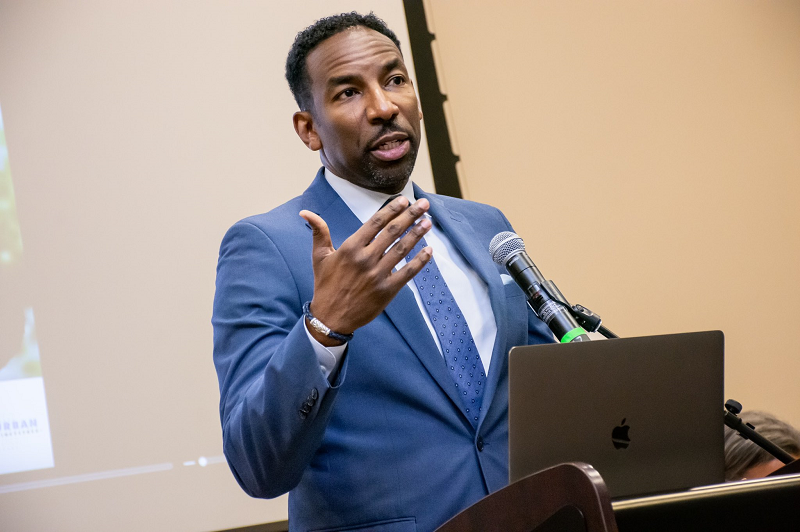
Photo: City of Atlanta/Twitter
US cities are gearing up for more public-private partnerships
29 June 2022
by Sarah Wray
Mayor of Atlanta, Andre Dickens, is leading a new mayors’ taskforce on public-private partnerships.
The group, which was launched by the US Conference of Mayors (USCM), will be a forum for mayors to discuss opportunities, challenges, and best practices around partnerships with private companies and non-profits.
Dickens told Cities Today that it’s an important time for such an initiative as cities look to make the best use of historic federal funding, including resources from the US$1.9 trillion American Rescue Plan Act and US$1.2 trillion Bipartisan Infrastructure Law, which were passed last year.
“Mayors have audacious goals on public safety, transportation and our other priorities, but we can’t realise them alone,” said Dickens. “The private sector plays an important role in delivering.”
“Staffing up our procurement people, our project management people, our delivery teams can be hard to do in this economy, hard with the labour shortage, and hard to do on a temporary basis of three to five years,” he said, noting some spending deadlines.
A survey from the Deloitte Center for Government Insights earlier this year pinpointed talent and expertise shortages as the biggest obstacle to implementing infrastructure projects over the next three years, ahead of data privacy and security risks, unclear roadmaps, and budget constraints.
Partnerships can also help cities save significant amounts of money while improving services for residents and helping grow local economies, according to USCM, which is a nonpartisan organisation of cities with populations of 30,000 or more.
Shared investment
Dickens said the first meeting of the taskforce at the USCM’s annual gathering in Reno earlier this month highlighted “huge interest” from mayors in public-private partnerships. These collaborations are typically characterised by shared investment, risk and reward from the public and private sector, which differs from the traditional vendor-client relationship.
Mayors also had common questions on the details of how public-private partnerships are initiated and structured.
“Who asks who to dance first?” said Dickens, who took office in Atlanta in January.
The new taskforce aims to gather best practices for mayors, and the private sector will be regularly invited to participate in meetings.
Dickens cited examples of public-private partnerships in Atlanta such as the At-Promise youth crime diversion programme and the Atlanta BeltLine, a 22-mile transit loop and redevelopment project.
Of the BeltLine project, which includes a range of governmental, non-profit, private and philanthropic partners, Dickens said: “The city wouldn’t have been able to apply this much personnel resources to something that doesn’t produce a direct financial payment yet. We make money from the increased property values and more people building and doing construction around this new amenity, but that’s delayed returns, so somebody’s got to front load this stuff.”
He added: “We had to do complicated public financing and also private investment to be able to make this work and I don’t know whether it would have worked as fast and as well without it.”
Mitigating risks
Public-private partnerships can also pose risks for cities, though, and mayors must go in with their eyes open.
Dickens said: “If you don’t go at it with your whole government goals in mind, certain things can be left on the table.”
Cities can negotiate not only on financial terms but also stipulations in areas such as equitable contracting, training, and community input.
“You also need to make sure that you as a city are ready for partnerships,” he commented. “And that it is a partnership: it’s not a dictatorship and you can’t just hand over to the company. You have to be an active participant in the partnership.”
Another potential risk is resident concerns about the outsourcing of public services. Dickens said it’s normal that residents and council members will have a variety of questions about ownership, responsibility, and other contractual specifics.
“It’s about building trust and educating the community,” he commented. “It’s not completely privatisation, it’s a partnership.
“That’s why at the onset of this, within the taskforce, we’re talking about those things now.”







